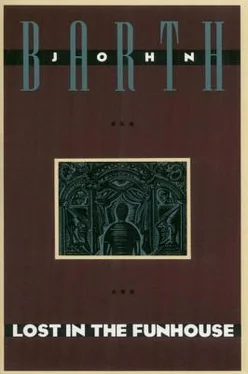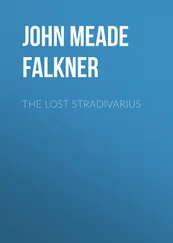John Barth - Lost in the Funhouse
Здесь есть возможность читать онлайн «John Barth - Lost in the Funhouse» весь текст электронной книги совершенно бесплатно (целиком полную версию без сокращений). В некоторых случаях можно слушать аудио, скачать через торрент в формате fb2 и присутствует краткое содержание. Год выпуска: 2014, ISBN: 2014, Издательство: Knopf Doubleday Publishing Group, Жанр: Современная проза, на английском языке. Описание произведения, (предисловие) а так же отзывы посетителей доступны на портале библиотеки ЛибКат.
- Название:Lost in the Funhouse
- Автор:
- Издательство:Knopf Doubleday Publishing Group
- Жанр:
- Год:2014
- ISBN:978-0-8041-5250-1
- Рейтинг книги:3 / 5. Голосов: 1
-
Избранное:Добавить в избранное
- Отзывы:
-
Ваша оценка:
- 60
- 1
- 2
- 3
- 4
- 5
Lost in the Funhouse: краткое содержание, описание и аннотация
Предлагаем к чтению аннотацию, описание, краткое содержание или предисловие (зависит от того, что написал сам автор книги «Lost in the Funhouse»). Если вы не нашли необходимую информацию о книге — напишите в комментариях, мы постараемся отыскать её.
Lost in the Funhouse — читать онлайн бесплатно полную книгу (весь текст) целиком
Ниже представлен текст книги, разбитый по страницам. Система сохранения места последней прочитанной страницы, позволяет с удобством читать онлайн бесплатно книгу «Lost in the Funhouse», без необходимости каждый раз заново искать на чём Вы остановились. Поставьте закладку, и сможете в любой момент перейти на страницу, на которой закончили чтение.
Интервал:
Закладка:
B called upon a literary acquaintance, B_____, summering with Mrs. B and children on the Eastern Shore of Maryland. “You say you lack a ground-situation. Has it occurred to you that that circumstance may be your ground-situation? What occurs to me is that if it is it isn’t. And conversely. The case being thus, what’s really wanting after all is a well-articulated vehicle, a foreground or upstage situation to dramatize the narrator’s or author’s grundlage. His what. To write merely C comes to suspect that the world is a novel, himself a fictional personage is but to introduce the vehicle; the next step must be to initiate its uphill motion by establishing and complicating some conflict. I would advise in addition the eschewal of overt and self-conscious discussion of the narrative process. I would advise in addition the eschewal of overt and self-conscious discussion of the narrative process. The via negativa and its positive counterpart are it is to be remembered poles after all of the same cell. Returning to his study.
If I’m going to be a fictional character G declared to himself I want to be in a rousing good yarn as they say, not some piece of avant-garde preciousness. I want passion and bravura action in my plot, heroes I can admire, heroines I can love, memorable speeches, colorful accessory characters, poetical language. It doesn’t matter to me how naively linear the anecdote is; never mind modernity! How reactionary J appears to be. How will such nonsense sound thirty-six years from now? ‡As if. If he can only get K through his story I reflected grimly; if he can only retain his self-possession to the end of this sentence; not go mad; not destroy himself and/or others. Then what I wondered grimly. Another sentence fast, another story. Scheherazade my only love! All those nights you kept your secret from the King my rival, that after your defloration he was unnecessary, you’d have killed yourself in any case when your invention failed.
Why could he not begin his story afresh X wondered, for example with the words why could he not begin his story afresh et cetera? Y’s wife came into the study as he was about to throw out the baby with the bathwater. “Not for an instant to throw out the baby while every instant discarding the bathwater is perhaps a chief task of civilized people at this hour of the world. †I used to tell B_____ that without success. What makes you so sure it’s not a film he’s in or a theater-piece?
Because U responded while he certainly felt rather often that he was merely acting his own role or roles he had no idea who the actor was, whereas even the most Stanislavsky-methodist would presumably if questioned closely recollect his offstage identity even onstage in mid-act. Moreover a great part of T’s “drama,” most of his life in fact, was non-visual, consisting entirely in introspection, which the visual dramatic media couldn’t manage easily. He had for example mentioned to no one his growing conviction that he was a fictional character, and since he was not given to audible soliloquizing a “spectator” would take him for a cheerful, conventional fellow, little suspecting that et cetera. It was of course imaginable that much goes on in the mind of King Oedipus in addition to his spoken sentiments; any number of interior dramas might be being played out in the actors’ or characters’ minds, dramas of which the audience is as unaware as are V’s wife and friends of his growing conviction that he’s a fictional character. But everything suggested that the medium of his life was prose fiction — moreover a fiction narrated from either the first-person or the third-person-omniscient point of view.
Why is it L wondered with mild disgust that both K and M for example choose to write such stuff when life is so sweet and painful and full of such a variety of people, places, situations, and activities other than self-conscious and after all rather blank introspection? Why is it N wondered et cetera that both M and O et cetera when the world is in such parlous explosive case? Why et cetera et cetera et cetera when the word, which was in the beginning, is now evidently nearing the end of its road? Am I being strung out in this ad libitum fashion I wondered merely to keep my author from the pistol? What sort of story is it whose drama lies always in the next frame out? If Sinbad sinks it’s Scheherazade who drowns; whose neck one wonders is on her line?
2
Discarding what he’d already written as he could wish to discard the mumbling pages of his life he began his story afresh, resolved this time to eschew overt and self-conscious discussion of his narrative process and to recount instead in the straightforwardest manner possible the several complications of his character’s conviction that he was a character in a work of fiction, arranging them into dramatically ascending stages if he could for his readers’ sake and leading them (the stages) to an exciting climax and dénouement if he could.
He rather suspected that the medium and genre in which he worked — the only ones for which he felt any vocation — were moribund if not already dead. The idea pleased him. One of the successfullest men he knew was a blacksmith of the old school who et cetera. He meditated upon the grandest sailing-vessel ever built, the France II , constructed in Bordeaux in 1911 not only when but because the age of sail had passed. Other phenomena that consoled and inspired him were the great flying-boat Hercules , the zeppelin Hindenburg , the Tsar Pushka cannon, the then-record Dow-Jones industrial average of 381.17 attained on September 3, 1929.
He rather suspected that the society in which he persisted — the only one with which he felt any degree of identification — was moribund if not et cetera. He knew beyond any doubt that the body which he inhabited — the only one et cetera — was et cetera. The idea et cetera. He had for thirty-six years lacking a few hours been one of our dustmote’s three billion tenants give or take five hundred million, and happening to be as well a white male citizen of the United States of America he had thirty-six years plus a few hours more to cope with one way or another unless the actuarial tables were mistaken, not bloody likely, or his term was unexpectedly reduced.
Had he written for his readers’ sake? The phrase implied a thitherto-unappreciated metaphysical dimension. Suspense. If his life was a fictional narrative it consisted of three terms — teller, tale, told — each dependent on the other two but not in the same ways. His author could as well tell some other character’s tale or some other tale of the same character as the one being told as he himself could in his own character as author; his “reader” could as easily read some other story, would be well advised to; but his own “life” depended absolutely on a particular author’s original persistence, thereafter upon some reader’s. From this consideration any number of things followed, some less tiresome than others, no use appealing to his author, of whom he’d come to dislike even to think. The idea of his playing with his characters’ and his own self-consciousness! He himself tended in that direction and despised the tendency. The idea of his or her smiling smugly to himself as the “words” flowed from his “pen” in which his the protagonist’s unhappy inner life was exposed! Ah he had mistaken the nature of his narrative; he had thought is very long, longer than Proust’s, longer than any German’s, longer than The Thousand Nights and a Night in ten quarto volumes. Morevoer he’d thought it the most prolix and pedestrian tranche-de-vie realism, unredeemed by even the limited virtues of colorful squalor, solid specification, an engaging variety of scenes and characters — in a word a bore, of the sort he himself not only would not write but would not read either. Now he understood that his author might as probably resemble himself and the protagonist of his own story-in-progress. Like himself, like his character aformentioned, his author not impossibly deplored the obsolescence of humanism, the passing of savoir-vivre , et cetera; admired the outmoded values of fidelity, courage, tact, restrainst, amiability, self-discipline, et cetera; preferred fictions in which were to be found stirring actions, characters to love as well as ditto to despise, speeches and deeds to affect us strongly, et cetera. He too might wish to make some final effort to put by his fictional character and achieve factuality or at least to figure in if not be hero of a more attractive fiction, but be caught like the writer of these lines in some more or less desperate tour de force. For him to attempt to come to an understanding with such an author were as futile as for one of his own creations to et cetera.
Читать дальшеИнтервал:
Закладка:
Похожие книги на «Lost in the Funhouse»
Представляем Вашему вниманию похожие книги на «Lost in the Funhouse» списком для выбора. Мы отобрали схожую по названию и смыслу литературу в надежде предоставить читателям больше вариантов отыскать новые, интересные, ещё непрочитанные произведения.
Обсуждение, отзывы о книге «Lost in the Funhouse» и просто собственные мнения читателей. Оставьте ваши комментарии, напишите, что Вы думаете о произведении, его смысле или главных героях. Укажите что конкретно понравилось, а что нет, и почему Вы так считаете.












